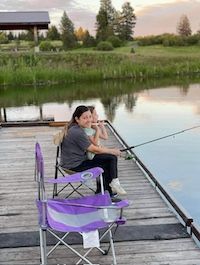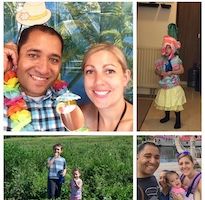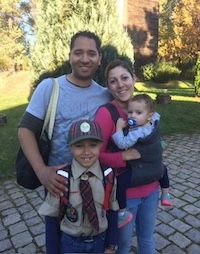| VFW Connections |
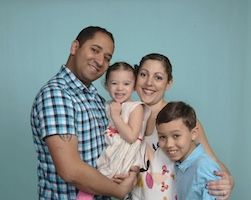 |
Soon after Jenny’s husband was stationed at Fort Belvoir, they saw Post 1503 and thought it was a great opportunity to sign up for the VFW. Jenny and Carmon visited the post during the 2023 Fourth of July celebrations to get more information about becoming members.
Now that they are both Comrades, Jenny says she wishes they would have signed up earlier! As Jenny and Carmon love volunteering, they hope to continue to lend their support to our programs.
|
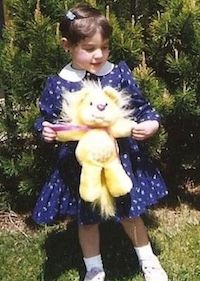 Both of Jenny’s parents served in the Navy. Her mother was granted a maternity discharge due to the birth of her first child, Jenny’s older sister. Two years later in Idaho, they welcomed Jenny into the family. Shortly after her birth, her family was stationed in Japan.
Both of Jenny’s parents served in the Navy. Her mother was granted a maternity discharge due to the birth of her first child, Jenny’s older sister. Two years later in Idaho, they welcomed Jenny into the family. Shortly after her birth, her family was stationed in Japan.
Jenny’s father was later transferred to Naval Air Station Whidbey Island in Washington. Her mother brought the girls to Idaho during this time, as many of their extended family members lived there. Jenny’s father then transitioned into the Reserves, so the family moved to Fernley, Nevada, for his job at Naval Air Station Fallon. When Jenny was in 2nd grade, her parents divorced. Her mother decided to move to Redding, California, where Jenny would live until she was 19.
During her senior year of high school, Jenny was accepted into a program called College Connections, which allowed her to enroll in college courses a year early. Although her middle and high school grades were average, she started to focus more on her education and excelled with the new academic challenges. Simultaneously, Jenny was inspired by her aunt’s profession as a massage therapist, so she also enrolled in night school to earn her massage therapy certification. After Jenny graduated from high school in 2005, she interviewed for massage therapy positions but realized that this profession would not provide her with enough income to live independently in California.
Military History
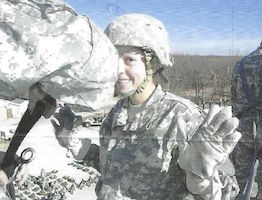 After Jenny had a few conversations about her future job prospects with her father, he encouraged her to speak with a recruiter. This seemed like a reasonable option, especially as her sister’s husband had also joined the military. Jenny decided to pursue an Army enlistment, especially as her college credits could help her move up in rank more quickly. She enlisted in 2006 as a 97E: a Human Intelligence Collector. On October 31, Jenny was at the local Military Entry Processing Station (MEPS), ready to be transported to boot camp. She headed to Fort Leonard Wood, Missouri.
After Jenny had a few conversations about her future job prospects with her father, he encouraged her to speak with a recruiter. This seemed like a reasonable option, especially as her sister’s husband had also joined the military. Jenny decided to pursue an Army enlistment, especially as her college credits could help her move up in rank more quickly. She enlisted in 2006 as a 97E: a Human Intelligence Collector. On October 31, Jenny was at the local Military Entry Processing Station (MEPS), ready to be transported to boot camp. She headed to Fort Leonard Wood, Missouri.
Four weeks before her graduation from boot camp, Jenny was asked to come to her Commander’s office. There, she learned that her recruiter had botched her paperwork, fraudulently signing her name to documents that he had neglected to give her. Although her father did the best that he could to mitigate the situation from home, Jenny had not been properly enlisted. 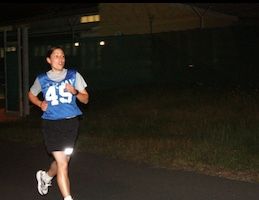
While this meant she could have walked away from the military with a clean slate, Jenny decided that she wanted to re-sign the correct paperwork to continue. However, this snafu impacted her ability to be promoted to E-3 as fast as she was initially promised by the recruiter.
In mid-January, Jenny finally started Advanced Individual Training (AIT) at Fort Huachuca, Arizona. When Jenny arrived, she learned that she would be part of a "35M test class.” Instead of completing their education and training over the standard 42 weeks, the coursework was condensed and accelerated into a 28-week program. Jenny’s cohort ended up being the first and last group for this pilot program, as many of the 97E hopefuls could not endure the pace of the training. However, Jenny persevered and graduated on time. 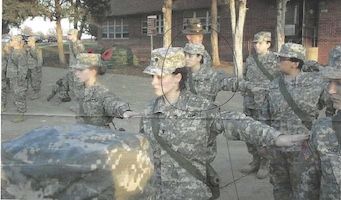
In 2007, Jenny’s received orders to her first duty station at Fort Hood, Texas. She was assigned to Military Intelligence (MI) as part of the rear detachment unit. (They awaited the return of the rest of the unit from Iraq.) She lived in barracks on the Air Force side of the base.
She remained there for a year before being transferred to Fort Irwin, California. She was part of a National Training Command (NTC) close to the Mohave Desert. They had their own MI unit, and this group was responsible for providing real-life intelligence infiltration experiences for soldiers who would face difficult combat situations in the future. During this time, Jenny also met and married a soldier who had transitioned from MI to the Army Criminal Investigation Division (CID). 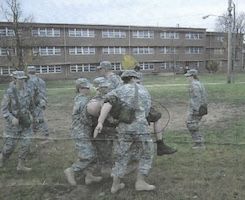
During one of Jenny’s field exercises at Fort Irwin, she sustained a serious head injury during a night mission. Their driver hit a ditch, and her body absorbed the violent movement as the vehicle flew through the air. She was transferred from the base hospital to the Balboa Naval Medical Center for a neurology specialist. It took three months of intense rehabilitation for her to learn how to walk again and rebuild her cognitive abilities.
Although she could have applied for a medical discharge, Jenny wanted to continue with her enlistment. She transitioned to working with the officers in a headquarters building, as she could help the leadership learn more information about how the base operations ran behind the scenes. Jenny was stationed at Fort Irwin for a total of four years before her reenlistment in 2009.
Jenny’s next duty station was in Wiesbaden, Germany. As her sister and brother-in-law were stationed just over an hour away in Heidelberg, it provided her with an opportunity to visit with them. However, her small company from the 66th MI Brigade was deployed to Iraq soon after her arrival. In 2010, the company was assigned to Camp Cropper in Baghdad. Over the next 12 months, they were tasked with preparing to wind down the campaigns from Operation Iraqi Freedom and Operation New Dawn. Jenny was also promoted to an E-5 while in Iraq.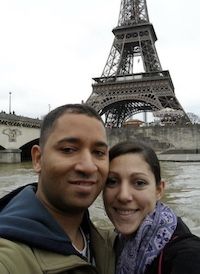
Although Jenny’s sister welcomed her back to Germany upon her return, her reintegration presented some challenges. Jenny and her then-husband faced a contentious divorce. She was also sent to a Warrior Leadership Course (WLC), which was also a lot to take in so soon after her deployment. However, she started working at the field office in Wiesbaden, determined to remain the professional soldier she always had been.
Over time, she and her now-husband, Carmon, formed a friendship and later started dating. While Jenny’s family was a bit concerned about her taking on the responsibility of a serious relationship, especially as Carmon came with his son and a dog, Jenny knew he was the right partner for her. In 2012, Carmon proposed at the New Year celebrations under the Eiffel Tower. 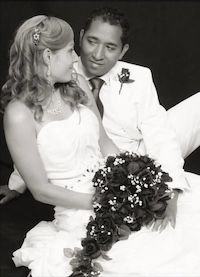
As their time in Germany was ending, both were able to secure orders to Fort Bliss, Texas. Not long after their arrival in 2013, Jenny was out to the field for a training exercise. She was being transported in the back of a vehicle, but the soldier who was driving was going too fast on the rocky desert terrain. Jenny’s head hit a pole, and she was knocked unconscious. Several other soldiers were also injured. The doctors determined that Jenny had sustained permanent damage to her occipital nerve. For a long time, Jenny had to remain in a wheelchair for her own safety. While Jenny can walk today, she holds canes at her sides for stability. She also continues to experience severe headaches and sporadic cognitive impacts.
Jenny and Carmon were married in August of 2013. Jenny worked tirelessly at physical therapy so she would be able to walk down the aisle. Jenny adopted Carmon’s son, and they joined together as a family unit. Despite all these challenges, they decided that they wanted to try to grow their family by one more. A year later, they welcomed a little girl.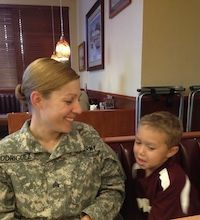
Due to continuing complications from her injuries, Jenny was told she could leave the military without further obligations—the third time in her career. Despite wanting to stay, Jenny’s doctors determined that it would not be safe for her to drive. Additionally, she required frequent breaks from work to avoid long-term cognitive fatigue and debilitating headaches. The operations center assisted Jenny with her transition.
In November of 2014, Jenny concluded her time in the Army.
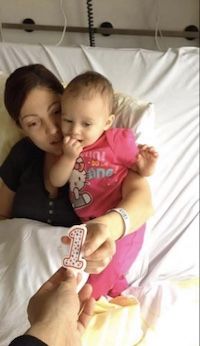 As a result of her continued medical challenges, Jenny was eligible for vocational rehab and support through Veterans Affairs. She went to school to complete a bachelor’s in business finance. She hopes to become a financial advisor in the future.
As a result of her continued medical challenges, Jenny was eligible for vocational rehab and support through Veterans Affairs. She went to school to complete a bachelor’s in business finance. She hopes to become a financial advisor in the future.
In 2016, Carmon was stationed at Hohenfels, Germany, taking over as Commander at the CID offices. Jenny continued her treatment and rehabilitation at the renowned Landstuhl Medical Center. During this time in Europe, the family took advantage of their opportunities to travel, including a beautiful trip to Corsica.
When Carmon received orders to Fort Belvoir in 2019, they found a home in the area. The children attend local schools, and the family is developing some roots here, especially as Carmon prepares for his retirement.
While they may end up moving in the future—perhaps to Wisconsin where close friends live—this is home for now. In the meantime, Jenny is engaged in several remodeling projects in their home, including redoing their bathrooms.
- Jenny lived close to her mother’s family when they moved to Idaho. Her grandmother lived right across the street from them for three years.
- Although Jenny moved homes six times while she lived in California, she was used to the transitions. At each new school, Jenny was able to adapt to her surroundings and make friends.
- Prior to joining the military, Jenny worked part time at The Cookie Jar, baking cookies and serving coffee to customers.
- Before she committed to serving in the military, Jenny spent a few weeks living with her father’s parents in Nevada to potentially enroll in a full-time college program. However, she soon realized that their expectations of what it would mean to live with them would not work out. She temporarily went to stay with her father, who was working in California as a stockbroker at this time.
- Jenny weighed her options carefully when deciding among the military branches. The local Air Force recruiter couldn’t guarantee her a position. She also wasn’t keen on spending so much time on a boat in the Navy, and the Marine Corps lifestyle wasn’t a good fit for her. Therefore, she decided to consider the Army.
- Jenny was initially unsure of what would be the best role in the military for her. However, her brother-in-law suggested that she consider the 97E series. Jenny had always been curious, asking many questions to understand the world around her. Therefore, he felt that her inquisitive nature would make her a strong interrogator. Although her recruiter was completely unfamiliar with this potential Military Operating Specialty (MOS), she still decided to pursue this role.
- Freezing rain during the fall season delayed the end of boot camp for Jenny’s cohort by two weeks. Despite participating in their graduation ceremony on time, they had to stay the additional weeks to complete the required training.
- Jenny recollects her time at Fort Irwin as being quite unique. The lower-enlisted group was entrusted with running their own unit, which they named the "taxi mission.” They would break into smaller groups to plan "attacks” on the other units at Fort Irwin for training to identify weaknesses in their security. This included spying on them, infiltrating areas of the base, engaging in ambush operations, and even interrogating their "prisoners.” They even wore a variety of "costumes” to make the experience seem more authentic with Observer Controllers to ensure everyone was staying in character. Jenny was nicknamed the Black Widow, as she was often a mole: she seemed like she was providing the groups with information when she was really gathering intelligence to identify and exploit weak points. While it was challenging for the group to spend three weeks out of each month in the desert without the usual housing, food, heating, or hygiene opportunities as the other soldiers, they still enjoyed the excitement of the hunt and the creative freedom to gather their intelligence. They also knew their efforts would make the command more aware and secure in the future.
- On one of her four-day weekends during her deployment in Iraq, Jenny was able to visit Saddam Hussein’s formerly opulent palaces.
- Although her deployment to Iraq was challenging, Jenny credits this time as allowing her to build stronger bonds with her family. They communicated regularly and sent Jenny care packages frequently. Her father would even send her "Go Navy” posters to make her laugh.
- Jenny’s husband remembers the first time he saw her. She brought cookies to the CID office in Wiesbaden for her now-ex. While she was deployed, she learned that "Rod” was staying at her home, as he was going through a difficult separation and trying to be a strong parent for his young son. Jenny also received care packages from Rod and his son. After Jenny’s separation, he reached out and the two of them chatted through MySpace. She learned that his first name was actually Carmon. They bonded over the challenges of their past relationships and built a friendship.
- Jenny recognizes that being a female in the military wasn’t always easy. Despite times when she was viewed as being "one of the guys,” she expected that she would be treated as a professional and equal. She sees that the military is growing positively today, ensuring that women are able to speak up and take on greater leadership roles than in the past.
